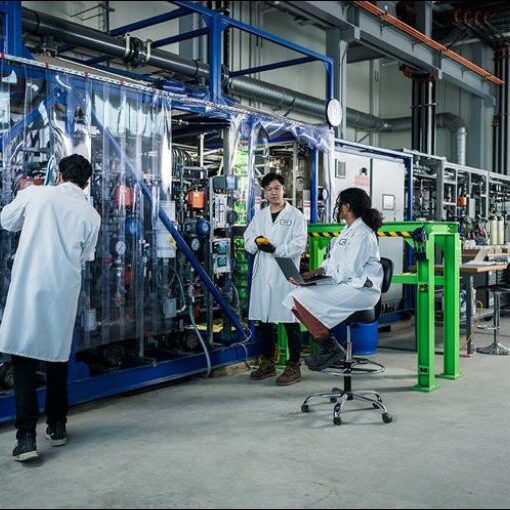“The only source of knowledge is experience.”
While this famous Albert Einstein quote could apply to the development of just about any disruptive technology, it is especially relevant to Mangrove Lithium’s partnership with NorthX – and to the game-changing lithium refinery it is turning from vision to reality.
Finding the best way forward
In June of 2023, NorthX provided $662,500 in seed funding for Mangrove to experiment with a roll-to-roll process for manufacturing the electrodes that play a key role in the five-year-old company’s patented electrochemical lithium refining tech. The goal: develop a commercially viable process that would enable a single refinery to scale up to produce more than 3,000 tonnes of battery-grade lithium per year.
Within six months, that goal had been achieved. But as it turned out, the initial continuous process was the second-best way forward. After comparing experimental trials with an alternative manufacturing process, it was determined that the latter was less costly, produced a more consistent product, and achieved higher performance targets – all factors that favour commercialization.
In other words, experience gained during experimentation, enabled through funding by NorthX, yielded vital knowledge in demonstrating the viability of Mangrove’s technology.
David Novitski
Director of Government Relations and Funding at Mangrove LithiumThe dominos start to fall

Next, Mangrove successfully produced five large-size refinery samples that “validated our tech at commercial scale,” Novitski says.
This proof-of-concept was instrumental to Mangrove recently securing $50.4 million in funding to build North America’s first independent electrochemical lithium refinery at its headquarters in Delta, BC. Scheduled to come online in early 2026 and expected to create at least 40 local and high-tech jobs, the plant is projected to produce enough lithium annually to power up to 25,000 electric vehicles (EVs). The funding round included new investors such as Mitsubishi, Export Development Canada, Asahi Kasei, Orion Industrial Ventures, and InBC Investment Corp., which has numerous ties to NorthX. Existing backers like BMW i Ventures, BDC, and Breakthrough Energy Ventures also took part.
“Our facility represents a huge opportunity to create a made-in-Canada supply chain with a cleaner, greener process,” Novitski says, adding that strengthening domestic refining capacity also enhances the attractiveness of Canadian lithium projects to investors. “Instead of copying high-emission and chemical-intense methods from overseas, we’re leading with sustainability and innovation. That’s a real point of pride and value for Canada.”
Standing up for sustainability
Lithium refining, like any industrial process, emits greenhouse gases (GHGs), even though its end use supports decarbonization. Mangrove aims to eliminate that contradiction with an electrochemical approach that emits 30 to 50 percent fewer GHGs than traditional refining. In regions with access to renewable electricity, its system can operate with even lower total emissions.
“One of the biggest advantages of our electrochemical platform is feedstock flexibility. We are able to convert lithium extracted from a variety of primary sources into a battery-grade product – including lithium from recycled batteries.” Novitski adds, “our process produces no waste, and actually produces fungible acid byproducts that can be recycled for use in upstream processing steps, further fostering a circular economy that does not yet exist in the lithium supply chain.” Novitski goes on to explain that Mangrove’s process is well-suited to capitalize on Canada’s abundant clean energy and can be powered using renewable electricity sources, such as hydroelectricity. This compounds the reduction in emissions within the lithium supply chain.
A superheated market
Global demand for lithium-ion batteries is set to grow dramatically this decade, with total capacity needs projected to rise from approximately 700 gigawatt-hours (GWh) in 2022 to roughly 4,700 GWh by 2030, according to McKinsey. Mobility applications, especially EVs, are expected to drive the lion’s share of this increase, accounting for nearly 4,300 GWh by the end of the decade. Battery energy storage systems (BESS) are also poised for explosive growth, with an estimated compound annual growth rate (CAGR) of 30 percent.
As battery use expands across sectors, the value chain is expected to see a fivefold increase in revenue. Industry-wide earnings are projected to surge from roughly $85 billion USD in 2022 to more than $400 billion USD by 2030.

From Canada to the world
As global demand continues to rise, nations with abundant lithium reserves, like Canada, are increasingly poised to capture more value within the battery supply chain. The current global supply chain remains heavily reliant on China, which currently accounts for more than 60 percent of the refining capacity for battery-grade lithium. This reliance creates a major supply chain bottleneck, as lithium often has to be transported internationally multiple times before it’s ready for battery production. Such imbalances heighten the risk of disruption, leaving companies involved in extraction, refining, and manufacturing increasingly vulnerable.
Organizations in other countries are also eyeing the benefits of domestic electrochemical lithium refining. Germany’s HELM AG, for instance, recently announced a Memorandum of Understanding (MoU) between its LevertonHELM subsidiary and Mangrove, whereby the companies have agreed to jointly explore the co-development of a European refining facility.
As more partnerships like these take shape, NorthX has been leveraging its network to introduce Mangrove to larger debt funders, including RBCx, Scotiabank, and National Bank. “Capital is a major challenge,” Novitski says. “We’re not a software company; this is hard tech with significant equipment and infrastructure costs. Scaling from our current operation to commercial facilities requires a major leap in financing.”
This leap is made easier by the Delta facility’s modular design, which can be replicated to scale production. This de-risks the tech and improves bankability, Novitski explains, making future investments easier to secure. The lithium material that comes out of this facility will then be tested and qualified by third parties, which will open doors for further commercialization.
“What I’ve learned is that momentum matters,” Novitski says. “Securing early support from NorthX not only helped with immediate project goals, but also built credibility that’s been essential as we’ve grown, hired more people, and raised additional capital. The journey’s been intense, but the momentum just keeps building.”
Mangrove Lithium received a $662,500 investment in 2023 through NorthX’s 2023 Call for Innovation. Learn more about Mangrove Lithium and meet our other innovators on our portfolio page.
